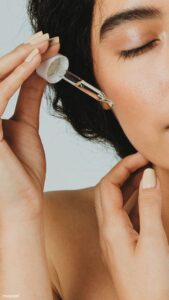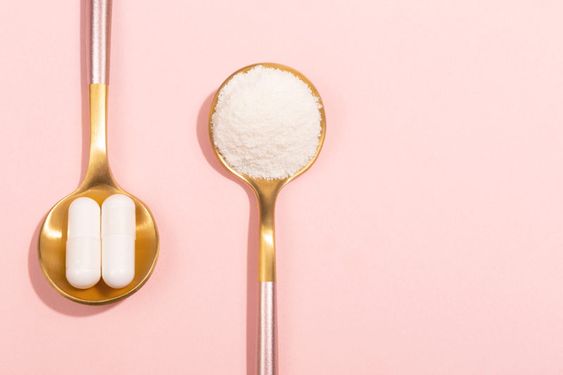What do we know about collagen?
Collagen is the most plentiful protein in your body. It plays various roles
including providing structure to your skin and helping your blood clot.
Collagen has gained popularity as a nutritional supplement and ingredient in shampoos, facial and body products.
Just in case you still are wondering what collagen is, as well as what it’s good for, this article gives you a thorough overview of this important protein we’ve been hearing about.
What is collagen?
Collagen is the most abundant protein in your body.
It plays an important role as is one of the major building blocks of bones, skin, muscles, tendons, and ligaments.
Collagen is also found in many other body parts, including blood vessels, corneas, and teeth.
Let’s put it this way, imagine Collagen as the glue that holds all these things together. In fact, Collagen comes from the Greek word “kólla,” which means glue.
What role Collagen plays in your body?
Did you know that there are at least 16 types of collagen. The four main types are type I, II, III, and IV
- Type I – Found in organs, bones, skin, and tendons. Type most responsible for healthy skin. Most abundant in skin.
- Type II, IX, X, XI – Found in cartilage.
- Type III – Very similar to Type I in its effect on skin appearance
- Type IV – Found in the filtration membranes of capillaries.
- Type V, VI – Found with Type I.
- Type IV – Found in the filtration membranes of capillaries.
- Type VIII – Found in the lining of blood vessels.
- Type XIII – Works with Type I and Type III.
As we age our body produces less and lower quality collagen, sad news we know :(.
One of the visible signs of your collagen getting depleted is in your skin, which becomes less firm and supple. Cartilage also weakens with age therefore we become a little slower and as we age becomes harder to move around like when we were young.
All collagen starts off as procollagen. Your body makes procollagen by combining two amino acids — glycine and proline. This process uses vitamin C.
You may be able to help your body produce this important protein by making sure you get plenty of the following nutrients:
- Vitamin C. Large amounts are found in citrus fruits, bell peppers, and strawberries.
- Proline. Large amounts are found in egg whites, wheat germ, dairy products, cabbage, asparagus, and mushrooms.
- Glycine. Large amounts are found in pork skin, chicken skin, and gelatin, but glycine is also found in various protein-containing foods.
- Copper. Large amounts are found in organ meats, sesame seeds, cocoa powder, cashews, and lentils
In addition, your body needs high quality protein that contains the amino acids needed to make new proteins. Meat, poultry, seafood and fish, dairy, legumes, and tofu are all excellent sources of amino acids.
Perhaps it’s even more important to avoid the following collagen-destroying behaviors:
- Eating too much sugar and refined carbs. Sugar interferes with collagen’s ability to repair itself. Minimize your consumption of added sugar and refined carbs
- Getting too much sunshine. Ultraviolet radiation can reduce collagen production. Avoid excessive sun exposure
- Smoking. Smoking reduces collagen production. This can impair wound healing and lead to wrinkles
Some autoimmune disorders, such as lupus, can also damage collagen.
Natural food sources
- Collagen is found in the connective tissues of animal foods. For example, it’s found in large amounts in chicken and pork skin.
- One particularly rich source is bone broth, which is made by boiling the bones of chicken and other animals.
- Gelatin is basically cooked collagen, so it’s very high in the amino acids needed to produce it.
- Marine collagen from wild caught fish
- plant-based collagen from seaweed
However, there’s debate over whether consuming collagen-rich foods actually increases the levels of this protein in your body.
When you eat protein, it’s broken down into amino acids and then reassembled, so the collagen you eat wouldn’t translate directly into higher levels in your body.
Collagen Synthesis:
Collagen is the primary structural protein found in skin, and is composed of long, fibrous strings of amino acids. Collagen is formed by specialized cells in the dermis called fibroblasts. When stimulated by molecules known as fibroblast growth factors, they synthesize small subunits of collagen, known as procollagen. These subunits are then transported out of the cell where they are strung into long chains that resemble fibres.
Native collagen vs collagen peptides
- Native proteins are unable to be absorbed directly into our bloodstream, they first need to be broken by protease enzymes in our stomach (pepsin & trypsin) into single amino acids.
- Long collagen chains are enzymatically hydrolyzed (broken down) to smaller pieces (peptides) to make them more bio active and bio available.
- Peptides are able to cross the intestinal mucosa via the transporter PEPT 1 and be directly absorbed hence why the molecular size of the collagen peptides is important.
- Collagen peptides have been shown to directly increase collagen, elastin and HA synthesis in our skin by stimulating fibroblasts.
- Marine collagen peptides have been shown to have superior bioavailability and improved skin hydration and elasticity. Marine collagen peptides are the gold standard.
 Our Collagen Active Serum uses a plant-based marine collagen from seaweed to help repair and strengthen the skin’s natural collagen and elastin. Vitamin C brightens the appearance of the skin texture instantly, while the Hyaluronic Acid hydrates and plumps the skin tissues. A must have for all skin care ranges.
Our Collagen Active Serum uses a plant-based marine collagen from seaweed to help repair and strengthen the skin’s natural collagen and elastin. Vitamin C brightens the appearance of the skin texture instantly, while the Hyaluronic Acid hydrates and plumps the skin tissues. A must have for all skin care ranges.
You can find our Collagen Active Serum here: Link to Product
Our Collagen Active Serum is a multifunctional active seaweed plant based Collagen Serum. Containing Vitamin C and Hyaluronic acid. This serum helps with repairing and strengthening the skin’s natural collagen and elastin. Vitamin C brightens the appearance of the skin texture instantly, while the Hyaluronic Acid hydrates and plumps the skin tissues. A must have skincare product.
Caras Skincare also recommends the fantastic Collagen Boost for internal support from Vita-Sol where you can find here : https://www.paulinadelosreyes.com.au/product/collagen-boost/
Collagen Boost from Vita-Sol is unflavoured, easy to add in coffee, tea, smoothies cooking and with other Vita-sol Whole Food Powders.
Daily dose of 2 tsp daily, this product is Nutritionist developed in conjunction with accredited Nutritionist, Fiona Tuck.
Collagen Boost is clean and there are no nasty ingredients, no GMO, eggs, nuts, gluten, dairy, synthetic vitamins, artificial ingredients, flavours, colours,preservatives or additives. Is suitable for skin elasticity, hydration, lines and wrinkles
Look at Caras Skincare products for beautiful and Natural Cosmeceuticals, for more information you can contact us on [email protected] or book an online skin consultation here: https://www.vagaro.com/paulinadelosreyesmakeupbeautyskinclinic/
With Love
Paulina de los Reyes
Owner / Director
Caras Skincare and Paulina de los Reyes Makeup Beauty Skin Clinic


